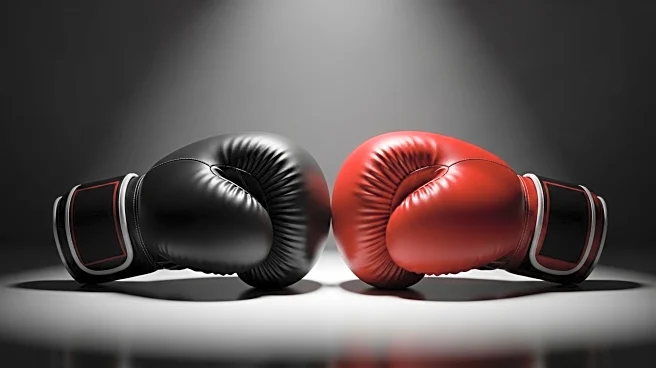What's Happening?
Mike Tyson and Floyd Mayweather, two of boxing's most renowned figures, have agreed to face each other in an exhibition match scheduled for spring 2026. The announcement was made by CSI Sports/Fight Sports, although the exact date and location are yet to be finalized. Tyson, who last fought Jake Paul in November, expressed surprise at Mayweather's willingness to participate, citing the unpredictability of the event. Mayweather, known for his undefeated 50-0 record, emphasized the legendary nature of the fight, assuring fans of a memorable experience.
Why It's Important?
The upcoming match between Tyson and Mayweather is significant for the boxing world, as it brings together two iconic fighters whose careers have shaped the sport. This exhibition fight is expected to draw substantial attention and viewership, potentially revitalizing interest in boxing exhibitions. While Mayweather's professional record remains unaffected, the event could influence future exhibition matches and the involvement of high-profile athletes. The fight also highlights the evolving nature of boxing, where entertainment and unpredictability are increasingly prioritized.
What's Next?
As the fight details are finalized, anticipation will build among fans and stakeholders in the boxing community. The event could lead to increased collaboration between boxing promoters and streaming platforms, given the potential for high viewership. Additionally, the match may inspire other retired or semi-retired athletes to consider similar exhibition bouts, further blurring the lines between professional and exhibition boxing. Stakeholders will likely focus on marketing strategies to maximize audience engagement and revenue.
Beyond the Headlines
The Tyson-Mayweather fight raises questions about the ethical implications of exhibition matches, particularly concerning the health risks for older athletes. As both fighters are advancing in age, the event underscores the need for careful consideration of safety protocols and medical oversight. Furthermore, the match reflects broader cultural shifts in sports entertainment, where legacy and spectacle often outweigh traditional competitive elements.










